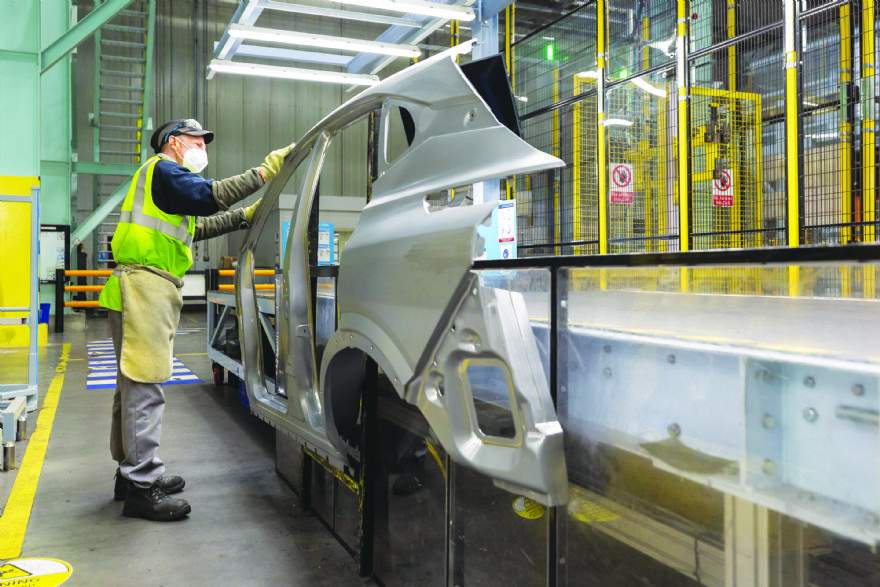
The manufacturing sector saw further growth of production, new orders and employment at the end of 2021. Although a slight easing in supply chain delays helped lift output volumes and take some of the heat out of input price increases, logistic disruptions and staff shortages were nonetheless still hampering the overall pace of expansion.
The seasonally adjusted
IHS Markit/
CIPS Purchasing Managers’ Index (PMI) rose to 57.9 in December, little-changed from November’s three-month high of 58.1. The PMI has now remained above the neutral 50.0 mark for 19 months.
Output rose across the consumer, intermediate and investment goods sectors during December, with the overall pace of expansion improving to a four-month high. Increased output was underpinned by rising intakes of new business, as domestic market conditions continued to strengthen.
The trend in new export business remained negative, however, as inflows of new work from overseas dropped for the fourth month in a row. This mainly reflected a steep decrease at consumer goods producers. In contrast, export demand for UK capital goods rose at the quickest pace since August.
Manufacturers indicated that logistic issues, Brexit difficulties and the possibility of further Covid restrictions, both at home and abroad, had all hit export demand at the end of the year.
Manufacturing employment increased for the twelfth successive month in December, with the rate of jobs growth staying close to November’s three-month high. Companies inked this to meeting improved demand, rising backlogs of work and efforts to address staff shortages.
However, capacity remained under strain, highlighted by a further increase in outstanding business, although the pace of expansion in work-in-hand volumes eased sharply to its lowest since February.
Positive outlookCompanies maintained a positive outlook at the end of 2021. The majority of firms (63%) forecast that production would increase over the coming 12 months, compared to only 6% anticipating a contraction. Optimism reflected expectations of renewed global economic growth, planned investment and hopes for less disruption caused by COVID-19, Brexit and supply chain issues.
Inflationary pressures remained elevated in December. The rate of increase in factory gate selling prices accelerated to a fresh series-record high, as companies passed on (at least in part) rising costs to their customers.
December saw a further substantial increase in average input prices, with the rate of inflation staying among the steepest seen in the survey history. There were reports of higher costs
for chemicals, electronics, energy, food products, metals, timber and wood. Freight, shipping and air transportation costs were also higher, while ongoing supply disruptions, raw material shortages and issues relating to Brexit and Covid-19 also led to higher prices paid.
Rob Dobson, IHS Markit director, said: “UK manufacturing production rose at the quickest pace in four months in December, supported by increased intakes of new work, efforts to reduce backlogs of work and higher employment.
“While the uptick in growth is a positive step, the upturn remains subdued compared to the middle of the year, as supply chain constraints and weak export performance constrained attempts to raise production further. Manufacturers indicated that logistic issues, Brexit difficulties and the possibility of further COVID restrictions (at home and overseas) had all hit export demand at the end of the year.
“Although supply chains remain severely stretched, there are at least signs that the situation is stabilising, with vendor delivery times lengthening to the weakest extent for a year in December. This helped take some of the heat out of input price increases, but cost inflation remained sufficiently steep to necessitate the sharpest rise in factory gate selling prices on record. With restrictions and Omicron cases both rising, the growth and inflation backdrops could change again in the early part of 2022."
Duncan Brock, Group Director at the Chartered Institute of Procurement & Supply, added:
“On the surface there wasn’t much of a change in the sector compared to last month but there was plenty to put manufacturers on edge about their prospects for the coming year.
“Purchasing by supply chain managers was at a four-month high as businesses tried to beat another near-record inflation rate for raw materials and ordered ahead of time in the hope of defeating future setbacks. Delay fears remained as supplier deliveries remained under pressure albeit to the least severe extent since December 2020.
“On the plus side, optimism remained positive as manufacturers were buoyed up by the strongest pipelines of new work driven by UK customers and employment levels rose for the twelfth consecutive month to meet demand.
“We can’t lose sight of the fact that the UK economy took a significant hit and new variants and potential lockdowns threaten to impede much needed progress but at least the sector ended the last quarter of 2021 on a surer footing.”